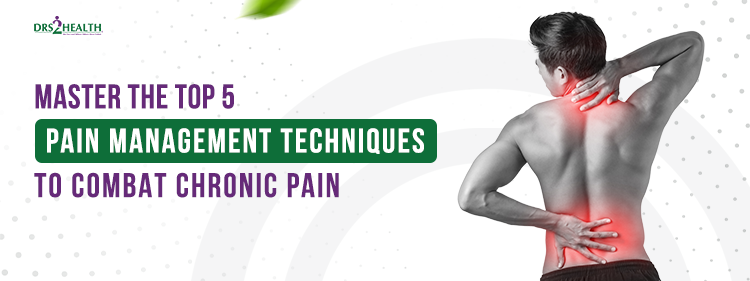
May 15, 2025
Food Allergies in Children and Adults: Signs, Testing, and Treatment Options.
347-843-0789
doctors@doctorstohealth.com

Persistent pain can be a serious ailment that affects many facets of life. So, It is important to learn efficient pain management procedures whether you are a patient looking for treatment for this condition or a healthcare provider looking to improve their skills.
This blog article will explain the top five techniques for managing pain and demonstrate how our in-depth training program, including Wellness Training and workshops, may assist you in providing your patients with long-lasting relief.
Consistent exercise and physical therapy are the most effective techniques for controlling and reducing chronic pain. Improving strength, flexibility, and mobility can help relieve pain and prevent injury. The therapist will treat particular pain concerns and develop a personalized workout program.
Techniques include massage, red light therapy, hot and cold therapy, and
Benefits:
—> Reduces inflammation and pain
—> Enhances muscle strength and flexibility
—> Elevates overall physical function
Mind-body practices like yoga, mindfulness, and meditation greatly impact managing chronic pain. By emphasizing the relationship between the mind and body, these techniques assist people in creating coping mechanisms and lowering their stress levels, which frequently make pain worse.
—> Reducing stress and anxiety
—> Encouraging pain alleviation and relaxation
—> Improving emotional wellbeing
Controlling chronic pain requires proper and effective medication management. This includes prescription drugs, over-the-counter painkillers, and complementary therapies such as CBD oil. Working closely with a healthcare practitioner guarantees pharmaceuticals’ safe and efficient use.
—> Provides immediate and sustained pain relief
—> Reduces inflammation
—> Improves quality of life
Cognitive Behavioral Therapy is a psychosocial method that helps individuals by changing their beliefs and actions related to pain. It addresses negative thought patterns and promotes healthier behaviors, which can reduce the perception of pain and improve coping mechanisms.
Benefits:
—> Decreases pain intensity
—> Improves mental health
—> Enhances coping strategies
Alternative therapies, such as massage therapy, chiropractic care, and acupuncture, offer more choices for treating and managing chronic pain. These treatments can complement traditional methods and provide holistic care.
—> Pain and muscle tension are reduced
—> Improves circulation
—> Enhances overall well-being
Our comprehensive pain management training program is designed for patients and healthcare providers. By enrolling in our program, you will gain access to:
—> Expert Instructors: Learn from experienced professionals who specialize in pain management.
—> Evidence-Based Techniques: Gain knowledge of the latest, research-backed methods for managing chronic pain.
—> Hands-On Training: Participate in practical sessions to apply what you’ve learned in real-world scenarios.
—> Supportive Community: Join a network of individuals who share your commitment to improving pain management.
Who Can Benefit from Our Pain Management Training Program?
Our training program is suitable for:
—> Patients: Individuals suffering from chronic pain who want to learn effective self-management techniques.
—> Healthcare Providers: Doctors, nurses, physical therapists, and other professionals looking to enhance their skills and offer better care to their patients.
—> Students: Individuals pursuing careers in healthcare who want to specialize in pain management.
If you’re ready to manage chronic pain or enhance your professional skills, our pain management training program is the perfect solution. Enroll today and start your journey toward mastering the techniques that can bring lasting relief.
By mastering these top five pain management techniques, you can significantly improve your quality of life or the lives of your patients. Don’t let chronic pain dictate your future—take the first step towards effective pain management today.

Leave a comment